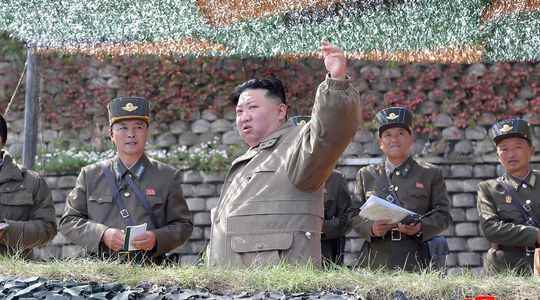In most of the photos released by the official KCNA agency, the young dictator appears in an immaculate white jacket and black pants. A gala evening? Not really. In one, Kim Jong-un sits pensively on top of a hill as a missile lifts through the rosy glow of dawn. On another, we see him from behind observing a shot that lights up the dark night. On a third, concentrated officers docilely take note of the word of their “supreme commander”.
Kim Jong-un personally supervised simulated “tactical nuclear operations” maneuvers between September 25 and October 9, the official KCNA news agency reported. During this period, the communist regime multiplied the firing of ballistic missiles (eight), one of which flew over Japan. Above all, a seventh nuclear test is in preparation. The South Korean intelligence services are waiting for him before the mid-term elections on November 8 in the United States: a way to remember Joe Biden…
Why does North Korea chain these “provocations”, denounced by Washington, Seoul or Tokyo? “In the past, North Korea was increasing the pressure to weigh in the negotiations or obtain the recognition of the United States as a nuclear state, even a lifting of the sanctions, judge Go Myong-hyun, of the Asan Institute of political studies. This time, Pyongyang just seems to seek to show its power to the world.” “North Korea is taking advantage of the distraction caused by the war in Europe to consolidate its status as a nuclear-weapon state that can target US territory. Kim Jong-un probably sees an advantage in making it harder for the Biden administration , already busy with Vladimir Putin’s nuclear threats and Xi Jinping’s military exercises around Taiwan,” said the Center for International and Strategic Studies (CSIS).
“Pyongyang has gained confidence in its armament”
Pyongyang probably also wants to “respond to Seoul’s strengthening of its deterrent capabilities with the United States”, analyzes his side Hong Min, of the Korean Institute for National Unification. Elected in March on the promise to toughen the tone against Pyongyang and to break with the policy of rapprochement of his predecessor, the progressive Moon Jae-in (2017-2022), Yoon Seok-youl, the new president, conservative, relaunched large-scale maneuvers with the Americans, which North Korea sees as preparation for the invasion of its territory. These exercises, carried out at the end of August and dubbed “Ulchi Freedom Shield”, were this year on a scale not seen since 2017, when tensions in the peninsula had reached their climax. Yoon also spoke of strengthening “extended deterrence” with the United States in the event of a new North Korean nuclear test. And South Korea did not hesitate to respond to Pyongyang with its own missile fire.
Enough to fuel an escalation. “Pyongyang has gained confidence in its armament. Contrary to what we have seen in the past, there will be no respite if the two parties continue to raise the tension”, worries the researcher Hong Min. In fact, KCNA points out, Pyongyang has “nothing to discuss with the enemy. We don’t feel any need to start talks.” Dialogue has stalled since the failed 2019 summit between Kim Jong-un and US President Donald Trump.
The serenity displayed by the heir to the communist dynasty, protected by Moscow and Beijing, is reinforced by the relative impunity he has enjoyed since the start of the war in Ukraine. It must be said that North Korea was one of the three countries in the world, with Syria and Russia, to recognize the annexation of Ukrainian provinces by Putin. Conversely, Moscow, which would be ready to buy North Korean stocks of ammunition, does not intend to vote new sanctions at the UN against Pyongyang and could even stop applying those in force. China, cold with Washington and the first economic and diplomatic support of Pyongyang, could adopt the same attitude. Even if she doesn’t like North Korean nuclear tests…
